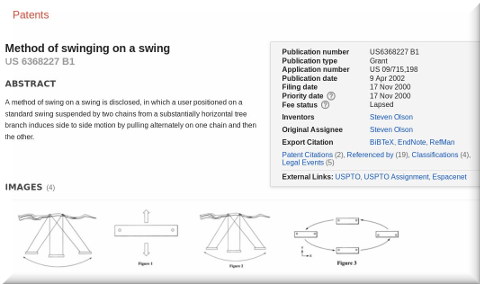

Being better than the USPTO is not the same as having acceptable patent quality (US 6368227 B1)
PATENT QUALITY at the EPO has sunk pretty low, as insiders tell us and staff representatives say as well (they have this new paper about it [PDF] -- a paper which somebody leaked to us). It seems to be the consensus inside the EPO that patent quality is far from what it used to be; it's only EPO management that keeps lying about it and the above was published internally because "the President is advertising our quality all over the world." Yes, the liar in chief is now making a career out of lying about everything. He calls himself "President" but acts like the world's worst boss, whose words are less than worthless. Some believe that he was intended to morph the EPO into the French model, which would basically render all the examiners redundant. The worst case scenario is, the guy is a 'liquidator' of the EPO. He's put in charge to destroy it.
“The analysis is particularly relevant now that the President is advertising our quality all over the world.”
--Internal documentA few days ago we saw this article in German about patent scope at the EPO. "European Patent Office discussed the objection of doctors in the world against the patent for the hepatitis C drug Solvaldi / decision on 5 October expected," says the automated translation. Also recall those letters regarding patents against cancer patients. If someone can prepare a translation of this article, that would be appreciated. Mathieu Klos from Juve has also just published an article in German for which we could use a translation. It's Battistelli talking points in 'interview' form and the summary is automatically being translated as: "The European Patent Office has reformed its Boards of Appeal in July. Until the beginning of 2017, the reform must be implemented. For a new Board President must be found. Critics complain that the reform does not bring enough independence for the EPO-court. JUVE interview EPO President Battistelli Beno it take a position and explains why the renewal fees for the EU patent reduce not necessarily when the UK, the EU and thus the new European patent system should leave."
We could use an English translation, so if someone can provide an outline or a complete translation, that would be great. Automated translations just aren't so reliable and there is room for misunderstanding that might impact our credibility.
Without the Boards of Appeal we can expect patent quality to decline even further without that decline being publicly acknowledged. This may be one plausible explanation for Battistelli's attack on these boards. An EPO mouthpiece has this new article which speaks about one particular aspect of European patents. It says: "The grounds of opposition are set out in Article 100 EPC. To paraphrase, these include that the subject-matter of the European patent is not patentable under Articles 52 to 57 (novelty, inventive step, industrial application, specific exclusions and non-inventions), that the patent is insufficiently disclosed and that the subject-matter of the patent extends beyond the content of the application as filed. The only substantive pre-grant criteria for patentability which is not also a ground for opposition is that of Article 84 EPC (that the claims shall be clear, concise and be supported by the description)."
"Remember that the lower the quality of EPO patents, the more damage will be done to the European economy, including by foreign entities like patent trolls."Under Battistelli, as we have shown here before, oppositions are being suppressed (made more expensive, time being prohibitive, and so on), so obviously the quality of patents will decline, without this decline even being detectable.
Why does this matter? Two main reasons:
Provisions exist in the United Kingdom to prevent unjustified threats of legal action relating to infringement of patents, designs and trademarks. The provisions were originally conceived with the intention of stopping the holder of an IP right from damaging a person’s business by threatening their customers or distributors with an infringement action of the IP right. The current provisions, however, are inconsistent across different forms of intellectual property and are worded such that an innocuous communication from an IP rights holder may be interpreted as an actionable threat. This results in an increased risk of litigation proceedings between the parties. This is contrary to the overriding principle enshrined in the UK’s Civil Procedure Rules, which encourage pre-action correspondence and negotiation in order to ensure that disputes are dealt with at proportionate cost.
The UK’s government issued a draft Bill setting out proposals to address some of these issues. The Intellectual Property (Unjustified Threats) Bill 2016 would update legislation relating to unjustified threats to provide greater consistency and clarity.
For example, the Bill proposes positive definitions for “permitted communications” to provide a safe harbor to allow rights holders to communicate with potential infringers, without running the risk of a threats action. In this way, parties should find it easier to comply with the Civil Procedure Rules by exchanging information prior to the start of any litigation.